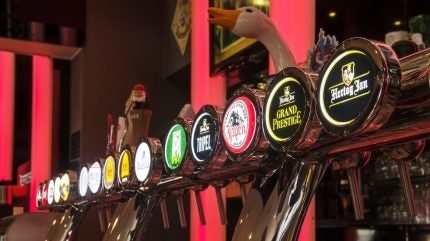
Beer consumption in the Netherlands continued to fall in the first half of the year as taxation changes inflated prices and poor weather curtailed outdoor drinking occasions, data shows*.
The government upped the excise duty on alcoholic beverages by 8% in January, while a consumption tax on alcohol-free beer has increased “almost 200%”, according to trade association Nederlandse Brouwers.
Poor weather in the country at the start of the year also reduced outdoor beer consumption, the trade body said.
While the European Championship football tournament “usually results in increased beer sales”, it said this year’s competition “was not enough to make up for the disappointing sales” particularly as the Dutch team failed to reach the final.
Between 1 January and 30 June, total beer sales fell 5.1% to 5.52m hectolitres compared to the first half of 2023.
Broken down by category, Pilsner sales fell 4.4% to 1.3m hectolitres, ‘specialty beer’ fell 4.6% to 667,000 hectolitres and non-alcoholic beer sales fell 9.4% to 387,00 hectolitres.
Nederlandse Brouwers said “stalling” consumption of non-alcoholic beer was the most “striking” statistic.
On 1 January, the government increased a so-called consumption tax on non-alcoholic drinks from €8.83 per hectolitre to €26.13 per hectolitre (a 196% increase).
The consumption tax is the same for all beverages, irrespective of sugar content. Mineral water is exempt. However, low-alcohol beer with 0.5% or less abv and other beverages with a maximum abv of 1.2% are included.
Nederlandse Brouwers chairman Fred Teeven said: “It is a worrying development that the sale of alcohol-free beer has decreased.
“Breweries have agreed with the government to stimulate alcohol-free beer, so that consumers always have the choice to opt for alcohol-free beer if they want to drink less alcohol.
“It is therefore inexplicable that the government has significantly increased the tax on alcohol-free beer. We call on the new cabinet to reverse this increase.”
Nederlandse Brouwers added the excise duty increase, which came into force on 1 January, was “still reverberating”, with shoppers crossing the border to neighbouring countries to buy beer.
“We see that more and more beer drinkers are getting their beer across the border, with major consequences for supermarkets and liquor stores and in the border regions,” Teeven said.
“We cannot help but see this reflected in the cross-border effects monitoring of the Ministry of Finance. We are curious to see what measures the new State Secretary will take, because this will also affect the quality of life in many villages if supermarkets have to close.”
In 2023, total beer sales in the Netherlands amounted to 11.56m hectolitres, marking a 5.6% fall from 2022 and even less than the pre-Covid 2019 figure of 12.13m hectolitres.
Sales of lager and beer mixes – such as radlers – fell by 6.5% and 15.2% respectively, which the Dutch brewers’ association attributed to bad weather last summer and increasing inflation.
In contrast to the first half of 2024, non-alcoholic beer was last year described as the “growth driver of beer sales over the past ten years” after sales “increased by 555% between 2010 and 2022”.
*The Nederlandse Brouwers data includes domestic brands as well as imported brands that are sold on the Dutch market. Beer that is brewed in the Netherlands and is exported to other countries is not included in the data.


